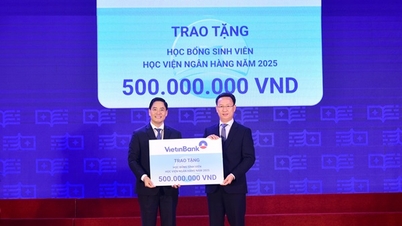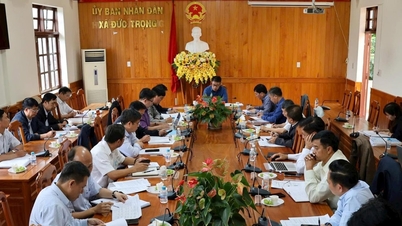
Cars made in Mexico are transported to the border gate for export to the US. Illustrative photo: Phi Hung/VNA reporter in Mexico
“Starting November 1, 2025, all medium and heavy duty trucks imported into the United States from other countries will be subject to a 25% tariff,” President Trump wrote in a post on the social network Truth Social.
The trucking industry is a cornerstone of the U.S. economy . However, profit margins across the U.S. logistics industry are typically quite low, making the industry highly sensitive to any unexpected increases in operating costs.
According to the American Trucking Association, the industry moves about 73% of all domestic freight in the United States. According to the U.S. Chamber of Commerce, about 2 million Americans work as heavy truck and tractor-trailer drivers, while many others work as mechanics and support staff.
According to data compiled by the US International Trade Commission, the top five sources of truck imports into the US by customs value are Mexico, Canada, Japan, Germany and Finland.
Those trade ties will be in focus this week, with White House press secretary Karoline Leavitt saying President Trump will meet with Canadian Prime Minister Mark Carney on October 7 and Finnish President Alexander Stubb on October 9. Ms. Leavitt declined to reveal details of Mr. Trump’s upcoming discussions with the leaders, but said trade policy could be among the topics discussed.
The truck tariffs come as the US Supreme Court considers the legality of trade policy - a central part of Mr Trump's economic agenda. The White House has defended Mr Trump's tariffs as a legitimate use of presidential power to protect the economy.
Figures released by the Treasury Department on September 29 showed that the US government collected $31.3 billion in tariff revenue in September 2025. Tariff revenue increased steadily from $17.4 billion in April to $23.9 billion in May, before increasing to $28 billion in June and reaching $29 billion in July.
American businesses pay these import tariffs directly to the federal government, but often pass the costs on to consumers through price increases—meaning the end consumer bears most of the burden.
President Trump's announcement relates to an investigation initiated by the US Department of Commerce in April into heavy truck imports. The investigation, conducted under Section 232 of the Trade Expansion Act, allows for import tariffs on items deemed important to national security.
The investigation focuses on medium- and heavy-duty trucks weighing more than 10,000 pounds (more than 4.5 tons), as well as vehicle parts. The Commerce Department said that “a small number” of foreign suppliers account for the majority of imports into the United States due to “unfairly competitive trade practices.”
The new tariffs threaten an industry already hit by steel and aluminum tariffs and tighter environmental regulations. The new import duties could push up the price of vehicles used in a range of sectors, including transportation, construction and utilities.
But supporters of the move say it will bolster domestic manufacturing. In a social media post last week announcing the new tariffs, Mr. Trump described them as necessary to “protect our great heavy-duty truck manufacturers from unfair foreign competition.”
Last year, the United States imported about 245,000 medium- and heavy-duty trucks, with a trade value of more than $20 billion, according to the Commerce Department. Mexico, one of the United States' top three trading partners, was the largest exporter of these trucks to the United States.
The new tariffs are part of a growing list of sectoral tariffs imposed by President Trump. The administration has already imposed tariffs on imports of steel, aluminum, copper, cars and auto parts. Additional tariffs on softwood lumber, lumber, kitchen cabinets, vanities and upholstered furniture will take effect on October 14, with some increases starting January 1.
Additionally, numerous Section 232 investigations are ongoing into imported solar panels, commercial aircraft, semiconductors, strategic minerals, robotics, medical devices, and industrial machinery.
Sectoral tariffs also give Mr. Trump more flexibility as his country-specific tariffs under the International Emergency Economic Powers Act (IEEPA) are being challenged in federal court. The U.S. Supreme Court has scheduled arguments for November 5.
Source: https://vtv.vn/my-ap-thue-nhap-khau-25-doi-voi-xe-tai-hang-trung-va-hang-nang-100251007080833559.htm





![[Photo] Prime Minister Pham Minh Chinh chairs the 16th meeting of the National Steering Committee on combating illegal fishing.](https://vphoto.vietnam.vn/thumb/1200x675/vietnam/resource/IMAGE/2025/10/07/1759848378556_dsc-9253-jpg.webp)































![[Photo] Super harvest moon shines brightly on Mid-Autumn Festival night around the world](https://vphoto.vietnam.vn/thumb/1200x675/vietnam/resource/IMAGE/2025/10/07/1759816565798_1759814567021-jpg.webp)

































































Comment (0)